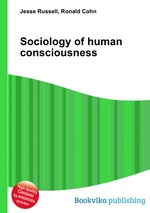Sociology of human consciousness
Jesse Russell Ronald Cohn
бумажная книга
High Quality Content by WIKIPEDIA articles! The sociology of human consciousness uses the theories and methodology of sociology to explain human consciousness. The foundations of this work may be traced to philosopher and sociologist George Herbert Mead, whose work provided major insights into the formation of mind, concepts of self and other, and the internalization of society in individual social beings, viewing these as emerging out of human interaction and communication (Walter Buckley, 1996; Norbert Wiley, 1994). Recent work (Buckley, 1996; Tom R. Burns and Erik Engdahl, 1998a, 1998b, Burns et al., 2003, among others) brings such a sociological and social psychological perspective to bear on several key aspects of consciousness, and in doing so inverts explanation: starting from collective phenomena, one ends up analyzing individual consciousness. In making this inversion, they do not totally reject reductionist approaches—nor deny their value in identifying the "hardware" through which collective and social psychological processes operate. (However, they would reject the idea that a complete explanation can be formulated on the basis of either purely sociological mechanisms or underlying physical, chemical, neurological, hormonal, or psychological factors and processes. For a critique of reductionism from the perspective of modern physics and biology see Morowitz (1981)). The biological and bio-physical bases of human life are recognized. However, these approaches cannot be relied on entirely. In part, the level of analysis is misdirected when it comes to some classes of consciousness phenomena; most of the natural science approaches focus on the wrong levels and the wrong factors with which to explain some of the most mysterious and paradoxical features of human consciousness.


